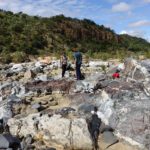Leading climate researchers and policymakers from across Southeast Asia will come together for an international symposium at Curtin University this month, to address how cities in the region can best cope with the warming climate.
The event will see attendees pool their collective knowledge to develop policies to combat urban warming, with a particular focus on sprawling cities such as Bangkok, Jakarta, Kuala Lumpur and Quezon City within the metro Manila area.
The Department of Foreign Affairs and Trade (DFAT) and the Partnerships for Infrastructure initiative enlisted a research team led by Curtin and supported by Murdoch University, to investigate the relevant issues and will present their project’s findings at the event.
Project lead and Curtin’s School of Earth and Planetary Sciences Director of Research, Associate Professor Ashraf Dewan, said the aim was to collaborate across Southeast Asian countries and research areas to develop ‘nature-based interventions’ to address concerns over warming cities.
“These can include measures such as improving the ratio of green surface area to buildings, the choice of materials when creating urban areas, choice of plants when landscaping and developing planning guidelines which include relevant climate information,” Associate Professor Dewan said.
“Increasing science-policy-practice partnerships and fostering strong multi-stakeholder engagement is very important in managing future climate risks, building climate resilience, and achieving net zero targets.
“If we can enhance local city governments’ ability to address growing climate challenges, it will help ensure a cleaner environment for the region and more liveable urban areas.”
Attendees will have the opportunity to provide feedback on the project’s findings, including proposed climate actions.
“The symposium will also provide insights into how we might best keep Australian cities and suburbs cool,” Associate Professor Dewan said.
Project Co-Lead Associate Professor Fazlul Rabbanee, from Curtin’s School of Management and Marketing, said the event will facilitate knowledge-sharing and will showcase findings of the two-year long project on the adequacy of city climate plans for mitigating weather extremes.
“The project integrates policy-practice gaps identified through panel and focus group discussions, key informant interviews of the national and local policymakers, plus earth observation and microclimatic insights and cost-benefit assessments, to co-create nature-based solutions to urban warming in the four cities.”
Attendees will include DFAT WA Office Director Sally Dawkins and several ambassadors and consul generals from around the region. The symposium will be held at Nesuto Curtin on the University’s Bentley campus on May 27.



